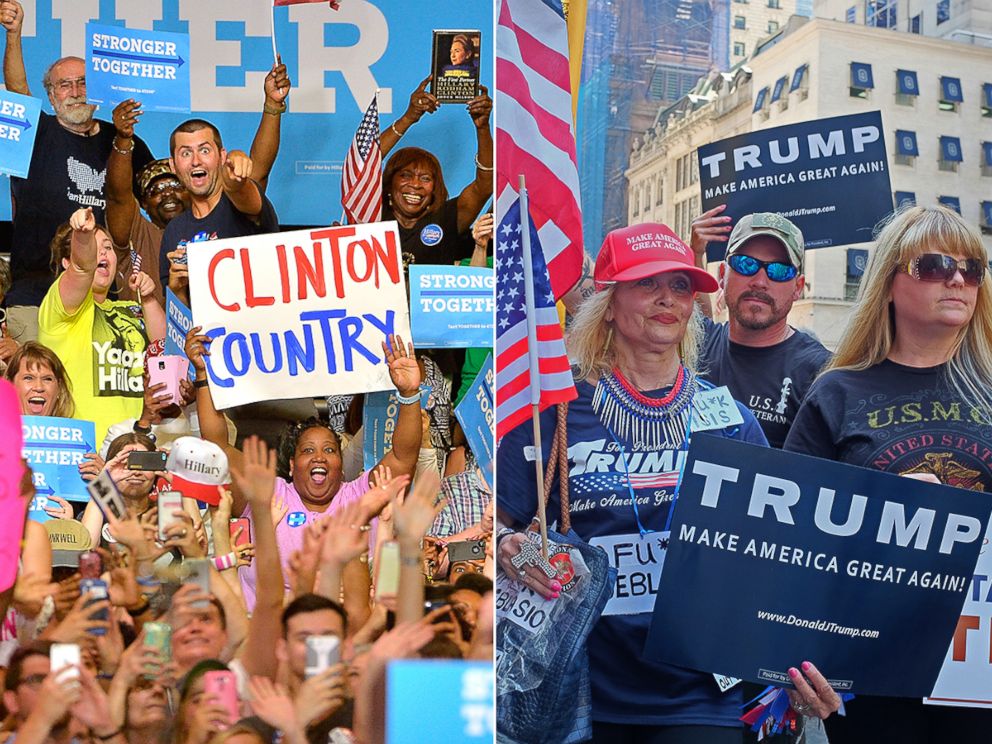Views on Experience vs. Outsider Status Pose a Potential Challenge for Trump (POLL)
Americans prefer experience to outsider status in the next president.
— -- Americans prefer experience to outsider status in the next president and also give it a higher priority in an ABC News/Washington Post poll, a potential challenge for Donald Trump as he builds toward the general election campaign.
The public by 55-41 percent prefers a president with “experience in how the political system works” over “someone from outside the existing political establishment.” Most Democrats want experience, while independents are split and most Republicans prefer an outsider.
See PDF with full results here.
Among those who prefer experience, moreover, 78 percent call it extremely or very important to them. Among those who prefer an outsider, fewer, 54 percent, call it highly important.
The experience/outsider division among registered voters is closer, 51-45 percent. Again, though, there’s a priority gap: Seventy-seven percent of registered voters who are focused on experience call it highly important, vs. 55 percent of those more interested in an outsider.
Other Issues
The poll also finds broad agreement that the next president should focus on improving race relations -- another potential difficulty for Trump -- and, perhaps surprisingly, on supporting international trade.
There’s less consensus on three other issues, immigration, gun control and abortion.
Putting an “especially strong focus” on trying to improve race relations tops the list of issues tested; more than eight in 10 Americans favor it and, among them, 83 percent call it highly important. As reported Saturday, Hillary Clinton leads Trump in trust to handle race relations by a wide 58-26 percent.

Seventy-five percent also say they’d rather see the next president favor trade agreements with other countries -- a counterintuitive result, given that, in an ABC/Post poll in May, more said trade with other countries takes away jobs than said it creates them, 53-33 percent. This poll asked if the next president should support or oppose trade agreements with other countries; respondents may have been thinking of the principle of honoring existing pacts. Regardless, it suggests that there’s room for both sides of the trade debate to make themselves heard.
Among other issues, six in 10 prefer a president who supports a path to citizenship rather than one who opposes it, 57 percent want someone who supports rather than opposes stricter gun control laws and 52 percent prefer a president who supports legal abortion in most cases.
Importance
As with experience vs. outsider status, there are differences in priorities. Supporters of trade agreements are more apt than opponents to call it a highly important issue, 65 vs. 43 percent. Eighty-one percent of those who favor stricter gun laws call it highly important, declining to six in 10 of those who’d rather see the next president oppose stricter gun laws.
Roughly six in 10 also say a candidate’s views on immigration and abortion are extremely or very important, but, in these cases, with about equal numbers on both sides of the issues.
Views on race relations and trade agreements are similar across partisan and ideological lines in this poll, produced for ABC by Langer Research Associates. On other issues there are sharp divisions, with Democrats preferring a president who supports a path to citizenship, stricter gun control and legal abortion in most cases, and Republicans favoring one who’d oppose each of these. Independents are more apt to side with Democrats.
Methodology
This ABC News/Washington Post poll was conducted by landline and cellular telephone July 11-14, 2016, in English and Spanish, among a random national sample of 1,003 adults. Results have a margin of sampling error of 3.5 points, including the design effect. Partisan divisions are 33-23-35 percent, Democrats-Republicans-independents.
The survey was produced for ABC News by Langer Research Associates of New York, New York, with sampling, data collection and tabulation by Abt-SRBI of New York, New York. See details on the survey’s methodology here.



